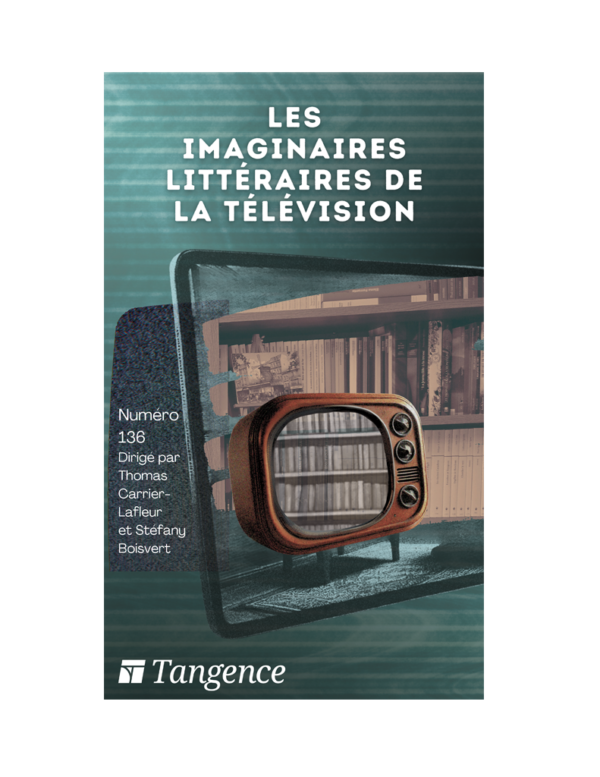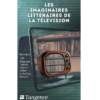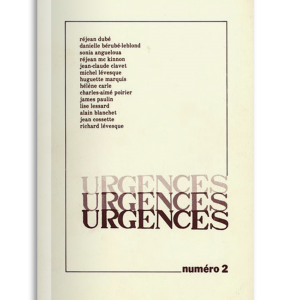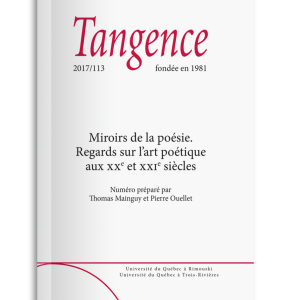Digital morphose and mutations of television and screens in Mukbang by Fanie Demeule
Caroline Loranger
Fanie Demeule’s Mukbang discusses the influence of screens in modern society by means of the mukbang, a practice whereby online users view live YouTube videos of persons consuming large quantities of food. The novel describes the tragedy of Kim Delorme, a young influencer who loses her life while attempting to ingest 20,000 calories during one such mukbang. In this work, Demeule uses over 200 QR codes to enrich the narrative with digital content, thereby underscoring themes of online addiction, eating disorders and social isolation despite hyperconnection. The article analyzes the negative representation of screen society in Mukbang by using the concept of “digital morphosis” to describe the transformation of television into a digital media, exacerbating its darker aspects on the Internet. The author explores how this mutation is developed in the novel and how the QR codes integrated into the text allow readers to feel the screens’ effects. This approach enriches the reading experience, transforming the novel into a “book-screen” that reflects on the influence and potential dangers of the new media.
The internal television of being : towards a phenomenology of the small screen
Cédric Kayser
Although television was the focus of sociocriticism in literature, and although certain postmodern writers emphasized the electric atmosphere of the 1980s, which coincided closely with Cold War issues, studies of the body’s experience of television entertainment are few and far between. This article proposes to examine this discrepancy, starting with the thesis by which we are witnessing new representations of the real in literature thanks to the democratization of television in the 1950s. In keeping with the screen’s role, which is to conceal on one hand and reveal on the other, each technological experience is underpinned by the presence of the lived body. Accordingly, the experience encompasses flesh, spatiality and eroticism.
The end of television ? Aurélien Bellanger’s Téléréalité or the fictional imaginaries of a “decadent” media
Thomas Carrier-Lafleur
The present article explores how reality TV, as portrayed in Aurélien Bellanger’s novel Téléréalité, reflects the transformations and perceptions of television as media. Bellanger’s text uses reality TV to examine the links between reality and representation and proposes a study of how this type of media influences, and is influenced by, contemporary social and cultural dynamics. The novel is presented as a saga tracing the evolution of television from a mass media to an all-inclusive cultural phenomenon, illustrating its capacity to model and reflect society. Accordingly, this article discusses the aesthetic and ideological aspects of reality TV, highlighting its role in the construction of television reality and its impact on collective and individual identity. As well, it underscores television’s shift to digital and interactive formats, marking an additional stage in the evolution of media narration. Reality TV is analyzed not only as a reflection of society, but also as an active agent in the creation of new forms of media reality, thereby offering a perspective on television as a media that is permanently reinventing itself.
Be seen, be like, be with : television, self and others
Joyce Cimper
This article focuses on Alexandra Kleeman’s novel, You Too Can Have a Body Like Mine, and various essays by Martine Delvaux. In their works, these two writers examine television, especially the impact of the images it broadcasts. They expose, among other things, the systems supporting patriarchal domination, which the small screen obscures by trivializing representations of male power and violence against women. Delvaux and Kleeman reflect on what it means to resist the abuses depicted in TV programs, to fight against the advertising diktats aimed at serializing women. The important subject of identity and its control is also discussed in relation to TV reality shows and the exhibitionist/voyeuristic tendencies encouraged by the small screen. Ultimately, Delvaux and Kleeman propose an examination of television and how it affects society, self-image and interpersonal relations.
Reality TV through the lens of novelistic literature : a dystopian imaginary to reflect on the mutations of the contemporary world
Pierre Barrette and Stéfany Boisvert
This article explores the representation of reality TV in contemporary novels. Through the study of fourteen novels published since the year 2000, it shows that a number of themes overlap, enabling us, if not to better understand reality TV itself, then at least to highlight what a literary imaginary of reality TV might be. It shows, therefore, how these works describe reality TV by criticizing its excesses and representing it as a dystopian phenomenon embodying alienation and mass manipulation. Besides establishing several parallels between reality TV and historical tragedies, most of the novels underscore its potentially destructive effects on society, exacerbating society’s tendencies towards voyeurism, exhibitionism, exploitation and narcissism. Although they emphasize the moral defects of a society fascinated by reality TV, the works tend, nevertheless, to replicate a critical view of reality TV as dangerous owing to its “feminization” of culture. The present article therefore stresses the importance of television in understanding the media and social mutations of our era.






